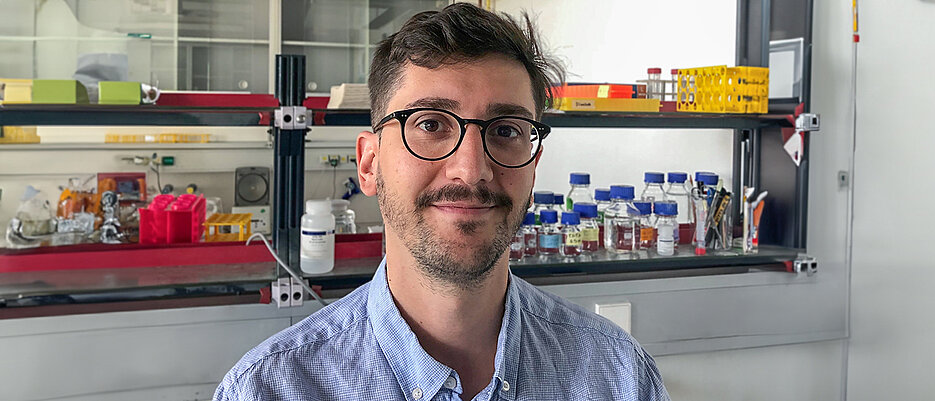1.5 Million Euros: ERC Starting Grant for Dimitrios Papadopoulos
09/05/2024At the University of Würzburg (JMU), Dimitrios Papadopoulos is investigating RNA-based mechanisms maintaining aggressive pediatric tumors. He has now been awarded one of Europe's most coveted fellowships for young scientists.

The MYCN protein: It is about a hundred thousand times smaller than a human hair and is at the center of the research of Dimitrios Papadopoulos, junior group leader at the Department of Biochemistry and Molecular Biology at the University of Würzburg (JMU). MYCN is a so-called transcription factor, a protein that binds to the human genome (DNA) and controls cell growth. If there is an abnormal amount of MYCN in a cell, it can lead to cancer.
“MYCN is a major contributor to the development of aggressive tumors that primarily affect children, such as neuroblastoma, one of the most common childhood cancers”, says Papadopoulos. “The goal of my research group is to learn more about the functions of MYCN in order to lay the groundwork for targeted and non-invasive cancer therapies. Existing treatments are often very physically demanding for children.”
For this project, the 36-year-old has now been awarded one of the coveted ERC Starting Grants from the European Research Council (ERC) totaling 1.5 million euros. The aim of the Starting Grant is to support excellent researchers at an early stage of their career on their way to scientific independence. The money will be made available over a period of five years.
What Papadopoulos' Cancer Research is all about
The Starting Grant will fund a project called “Dissecting transcription termination and RNA sorting in MYCN-driven tumors” or “TerSor” for short. What sounds complicated is actually easy to explain: Papadopoulos' team has discovered that MYCN can bind not only to DNA and thus promote the growth of cancer cells, but also to RNA. RNA stands for ribonucleic acid and, like DNA, is a carrier of genetic information.
When MYCN binds to RNA, it basically has the opposite molecular effect than when it binds to DNA. Inhibiting RNA binding can even make cancer cells more sensitive to chemotherapy. The main goal of TerSor is to understand how RNA-bound MYCN functions. A fundamental understanding of this function should enable the development of new treatments that specifically kill aggressive tumors.
“The ERC Starting Grant is a great honor and recognition of our work to date and an incentive for future research”, says Dimitrios Papadopoulos. “The funding is also a big step towards setting up my own independent research group!” Papadopoulos intends to use the 1.5 million euros to hire staff, including postdoctoral researchers, and to fully fund the staff’s research needs.
Career of the ERC Awardee
Born in 1988, Dimitrios Papadopoulos studied biology at the University of Athens. After completing his PhD at the Justus-Liebig-University Giessen, he joined the research group of Prof. Martin Eilers, Head of the JMU-Chair of Biochemistry and Molecular Biology, in 2018. In 2023, he founded his own research group as Principal Investigator in a new consortium (CRC1588) funded by the German Research Foundation (DFG). In the same year, he received the Young Investigator Award of the German Cancer Society.
Contact
Dr. Dimitrios Papadopoulos, Group Leader at the Department of Biochemistry and Molecular Biology, Phone +49 931 31-89352, dimitrios.papadopoulos@uni-wuerzburg.de






